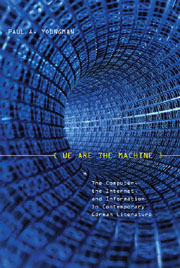Book contents
- Frontmatter
- Contents
- Preface
- Acknowledgments
- Introduction: Machines, Computers, and the Liberal Humanist Subject
- 1 Losing Ground to the Machine: Electronic Brains in the Works of Heinrich Hauser and Friedrich Dürrenmatt
- 2 Fearing the Machine — Two Nightmares in the 1990s: Gerd Heidenreich's New Riddle of the Sphinx and Barbara Frischmuth's Hidden Meaning
- 3 Becoming the Machine: Günter Grass's and Erich Loest's Virtual History, René Pollesch's Postdramatic Imaginings, and “Real” Cyber-Relationships according to Christine Eichel and Daniel Glattauer
- Conclusion: Questions to Ponder
- Bibliography
- Index
Conclusion: Questions to Ponder
Published online by Cambridge University Press: 05 February 2013
- Frontmatter
- Contents
- Preface
- Acknowledgments
- Introduction: Machines, Computers, and the Liberal Humanist Subject
- 1 Losing Ground to the Machine: Electronic Brains in the Works of Heinrich Hauser and Friedrich Dürrenmatt
- 2 Fearing the Machine — Two Nightmares in the 1990s: Gerd Heidenreich's New Riddle of the Sphinx and Barbara Frischmuth's Hidden Meaning
- 3 Becoming the Machine: Günter Grass's and Erich Loest's Virtual History, René Pollesch's Postdramatic Imaginings, and “Real” Cyber-Relationships according to Christine Eichel and Daniel Glattauer
- Conclusion: Questions to Ponder
- Bibliography
- Index
Summary
I think that novels that leave out technology misrepresent life as badly as Victorians misrepresented life by leaving out sex.
— Kurt Vonnegut, A Man Without a Country (2005)IN THE BEGINNING OF THE COMPUTER AGE in German-speaking countries, Hauser and Dürrenmatt raised concerns about human and computer co-evolution and the Singularity which, they argued, would mark the beginning of an era of conscious machines. Hauser's novel is also a study of the space of the computer. The user literally walked inside the computer and lost touch with the reality outside of the computer. The computer even created space that seemed somehow more “real” to his characters than the outside world. Moreover, Hauser added the ingredient of a computer-based network to the mix and showed how a centralized network could consolidate information and thus power. In this case, a computer with a misguided understanding of humanistic concerns, despite the best intentions of its creator, wielded its power with lethal results.
By the 1990s and the early part of the twenty-first century, those concerns remained intact in the popular consciousness in the countries that are the focus of this study. Indeed, by the contemporary IT era, such concerns had had plenty of time to ferment, so to speak, in the human imagination. This era, however, is characterized by a new reality in IT — the computer as a communications medium. The Austrian, German, and Swiss literature examined in this study shows an accumulation of additional worries associated with this new development that were, in some ways, more subtle than those of the twentieth century.
- Type
- Chapter
- Information
- We Are the MachineThe Computer, the Internet, and Information in Contemporary German Literature, pp. 153 - 158Publisher: Boydell & BrewerPrint publication year: 2009



